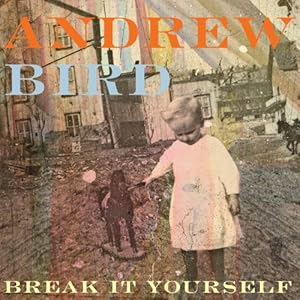 Ian Bavitz (aka Aesop Rock) comes from the school of underground hip-hop in NY that made its way to the forefront in the late 1990s/early 2000s. While he has been making music since his debut Music for Earthworms (1997), the spotlight has only been getting brighter since the release of Labor Days (2001) on Def Jux (El-P's Manhattan-based label). This particular release saw Aesop tackle the American labor society and how so many people are essentially slaves to a paycheck. In addition, the single "Daylight" was re-released as an EP all to itself. Aesop Rock's claim to fame is in large part due to his voice and lyrical content. Sometimes he is barely comprehensible, other times his lyrics only vaguely make sense. In some ways, his voice isn't just to spout personal opinions but rather to be part of the production as an instrument or sample unto itself. His production is usually dark, dirty, yet melodic in tone.
Ian Bavitz (aka Aesop Rock) comes from the school of underground hip-hop in NY that made its way to the forefront in the late 1990s/early 2000s. While he has been making music since his debut Music for Earthworms (1997), the spotlight has only been getting brighter since the release of Labor Days (2001) on Def Jux (El-P's Manhattan-based label). This particular release saw Aesop tackle the American labor society and how so many people are essentially slaves to a paycheck. In addition, the single "Daylight" was re-released as an EP all to itself. Aesop Rock's claim to fame is in large part due to his voice and lyrical content. Sometimes he is barely comprehensible, other times his lyrics only vaguely make sense. In some ways, his voice isn't just to spout personal opinions but rather to be part of the production as an instrument or sample unto itself. His production is usually dark, dirty, yet melodic in tone.
None Shall Pass is a great album compared to most of the rubbish hip-hop artists are producing currently. On the other hand, None Shall Pass is just a good album when comparing it to the upper echelons of other underground hip-hop. The main difficulty with the album is the uneven quality of the production. The standout tracks come from guest producers rather than the the ones produced by Aesop himself. Had he stayed away from the production a little more the album would be extremely tight and eclectic from track to track. Unfortunately, when there are a few tracks by Aesop back to back they meld together and become somewhat monotonous. The bulk of production comes from Blockhead, Aesop's long-time producing partner. It's possible that Aesop has learned mostly from his friend, and therefore his sound is too close to that of his buddy's. Aesop Rock's lyrical content on the album is sometimes hard to understand both aurally and technically. His message is usually pretty opaque, but that doesn't mean it's not highly enjoyable. It probably could have been much better had he brought in El-P to produce a couple more tracks or had a guest spot from Percee P. Any way you slice it, this album is incredibly more interesting and nuanced than 80% of the hip-hop currently circulating stereos and headphones today.
couple more tracks or had a guest spot from Percee P. Any way you slice it, this album is incredibly more interesting and nuanced than 80% of the hip-hop currently circulating stereos and headphones today.
Monday, September 24, 2007
Aesop Rock - None Shall Pass
Posted by
ethan a. zimman
at
2:11 PM
![]()
Subscribe to:
Post Comments (Atom)








No comments:
Post a Comment